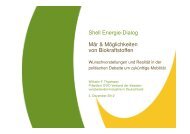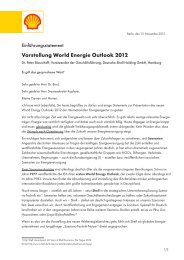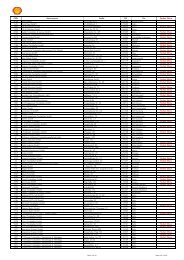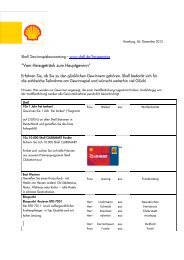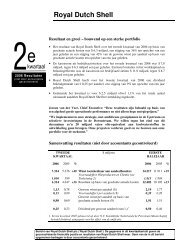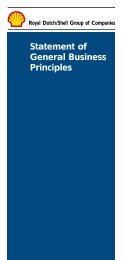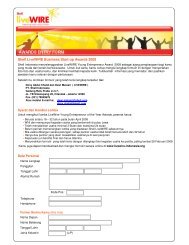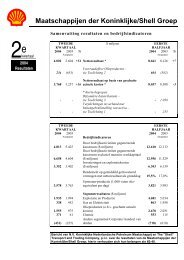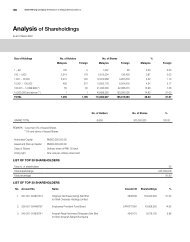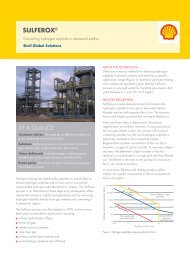62414 sustain 40pp (Mag)
62414 sustain 40pp (Mag)
62414 sustain 40pp (Mag)
Create successful ePaper yourself
Turn your PDF publications into a flip-book with our unique Google optimized e-Paper software.
RESPONSIBLE ENERGY<br />
Standards, governance,<br />
controls and incentives<br />
Making <strong>sustain</strong>able development central<br />
to how we work needs the right<br />
standards, governance, controls and<br />
incentives. These are outlined here and<br />
described in detail on our website.<br />
In 2006, we took additional steps to clarify<br />
what we expect from staff, increase their skills<br />
and share our knowledge better around Shell.<br />
Standards<br />
All companies and joint ventures where we<br />
have a controlling interest – for example as<br />
majority shareholder or operator – apply the<br />
Shell General Business Principles, the Code<br />
of Conduct and the other parts of the Shell<br />
Control Framework.<br />
Our Principles require compliance with all<br />
applicable laws and support for human rights.<br />
They forbid bribery, fraud and anti-competitive<br />
behaviour and commit us to contribute to<br />
<strong>sustain</strong>able development, including engaging<br />
with external stakeholders.<br />
These companies and joint ventures must<br />
also apply Shell-wide environmental and<br />
social standards. These include the Group<br />
HSE policy and commitment and standards<br />
for animal testing, biodiversity, climate<br />
change, environmental management, health<br />
management, security, ship quality and our<br />
relationship with our people.<br />
New in 2006<br />
• First Shell-wide Code of<br />
Conduct launched.<br />
• Guidance for new upstream projects<br />
revised to integrate environmental<br />
and social considerations earlier into<br />
major decisions.<br />
• Guidance issued on responsible<br />
public advocacy.<br />
• First Project Academy learning<br />
events rolled out to strengthen<br />
project management skills and<br />
share best practice.<br />
30 THE SHELL SUSTAINABILITY REPORT 2006<br />
We require contractors to manage HSE in line<br />
with our standards and expect them to follow<br />
our Business Principles or equivalent ones<br />
when working for us. We also encourage joint<br />
ventures where we do not have a controlling<br />
interest and suppliers to adopt and follow<br />
equivalent principles and HSE standards. If<br />
these contractors, suppliers and ventures cannot<br />
meet our expectations within a reasonable time,<br />
we are required to review the relationship,<br />
which can involve actions up to and including<br />
ending the relationship.<br />
Our principles and standards are reflected in<br />
our business processes. They are included in<br />
the criteria used to assess investment proposals<br />
and in the planning and design of major new<br />
projects. For example, we include the<br />
expected future costs of emitting CO2 when<br />
making all major investment decisions. An<br />
impact assessment is required before we begin<br />
significant work on a project or at an existing<br />
facility. The actions the impact assessment<br />
identifies must be part of the project’s design<br />
and operation. All our major refining and<br />
chemicals facilities, and upstream operations<br />
with potential for high social impact, must also<br />
have social performance plans.<br />
These plans set out how the facility will<br />
manage its social impacts and generate benefits<br />
for the local community (page 26).<br />
In 2006, our Exploration & Production<br />
business further tightened its requirements in<br />
this area for new projects at the earliest stages<br />
of project design. It introduced reviews of our<br />
70 most important new oil and gas prospects<br />
by environmental and social experts from the<br />
business and central functions. Some of these<br />
projects are still in the exploration or early<br />
design phases.<br />
We also align our requirements with external<br />
principles and standards such as the UN<br />
Universal Declaration on Human Rights, UN<br />
Global Compact, OECD Guidelines for<br />
Multinational Enterprises and the Extractive<br />
Industries Transparency Initiative (page 28).<br />
Governance<br />
The Social Responsibility Committee of our<br />
Board reviews our <strong>sustain</strong>able development<br />
policies and performance (see box). The Chief<br />
Executive is responsible for <strong>sustain</strong>able<br />
development. On his behalf, the Corporate<br />
Affairs Director chairs the Group Sustainable<br />
Development and HSE Executive, which<br />
reviews performance and sets priorities, key<br />
performance indicators and targets. The central<br />
Social Performance Management Unit, the<br />
Group HSE Function and Group Issues<br />
Management challenge, and support our<br />
businesses, helping them develop the skills they<br />
need, share learning and take a consistent<br />
approach to addressing their environmental<br />
and social issues.


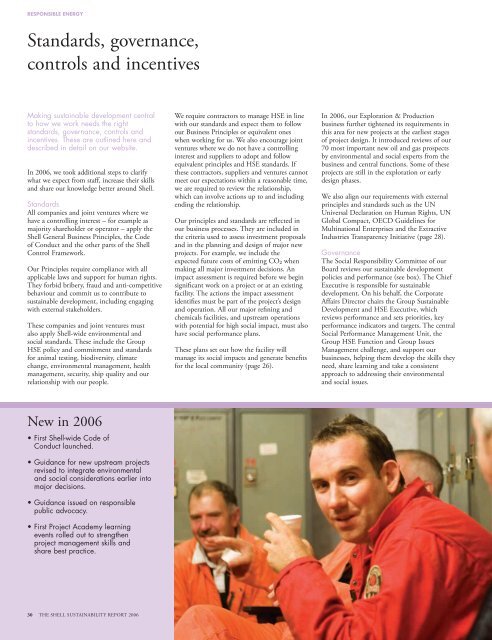

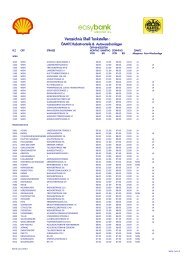
![Download Shell AutoGas Stationen [Stand: Januar 2013] (PDF](https://img.yumpu.com/9982753/1/190x245/download-shell-autogas-stationen-stand-januar-2013-pdf.jpg?quality=85)
